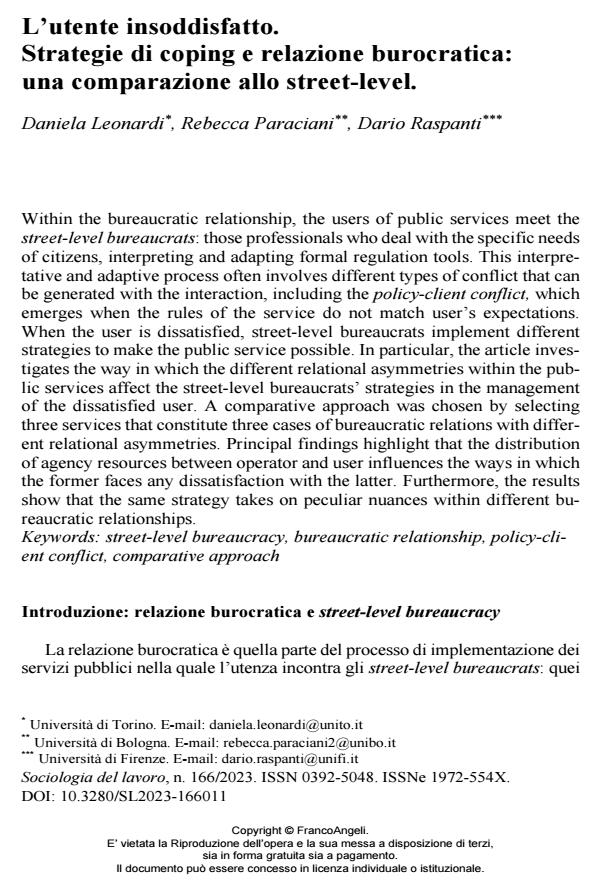L’utente insoddisfatto. Strategie di coping e relazione burocratica: una comparazione allo street-level.
Titolo Rivista SOCIOLOGIA DEL LAVORO
Autori/Curatori Daniela Leonardi, Rebecca Paraciani, Dario Raspanti
Anno di pubblicazione 2023 Fascicolo 2023/166
Lingua Italiano Numero pagine 20 P. 251-270 Dimensione file 258 KB
DOI 10.3280/SL2023-166011
Il DOI è il codice a barre della proprietà intellettuale: per saperne di più
clicca qui
Qui sotto puoi vedere in anteprima la prima pagina di questo articolo.
Se questo articolo ti interessa, lo puoi acquistare (e scaricare in formato pdf) seguendo le facili indicazioni per acquistare il download credit. Acquista Download Credits per scaricare questo Articolo in formato PDF

FrancoAngeli è membro della Publishers International Linking Association, Inc (PILA), associazione indipendente e non profit per facilitare (attraverso i servizi tecnologici implementati da CrossRef.org) l’accesso degli studiosi ai contenuti digitali nelle pubblicazioni professionali e scientifiche.
Within the bureaucratic relationship, the users of public services meet the street-level bureaucrats: those professionals who deal with the spe-cific needs of citizens, interpreting and adapting formal regulation tools. This interpretative and adaptive process often involves different types of conflict that can be generated with the interaction, including the policy-client conflict, which emerges when the rules of the service do not match user’s expectations. When the user is dissatisfied, street-level bureaucrats implement different strategies to make the public ser-vice possible. In particular, the article investigates the way in which the different relational asymmetries within the public services affect the street-level bureaucrats’ strategies in the management of the dissatis-fied user. A comparative approach was chosen by selecting three ser-vices that constitute three cases of bureaucratic relations with different relational asymmetries. Principal findings highlight that the distribution of agency resources between operator and user influences the ways in which the former faces any dissatisfaction with the latter. Furthermore, the results show that the same strategy takes on peculiar nuances within different bureaucratic relationships.
Parole chiave:street-level bureaucracy, bureaucratic relationship, policy-client conflict, comparative approach
Daniela Leonardi, Rebecca Paraciani, Dario Raspanti, L’utente insoddisfatto. Strategie di coping e relazione burocratica: una comparazione allo street-level. in "SOCIOLOGIA DEL LAVORO " 166/2023, pp 251-270, DOI: 10.3280/SL2023-166011